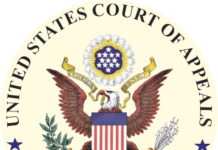(Updated to include more reaction and a more fuller look at the scope of the law that was struck down.)
A Johnson County judge has ruled unconstitutional the state’s new emergency management law, which allows parents to bring grievances against school districts for health orders issued during the pandemic.
Johnson County District Judge David Hauber ruled that the law passed last session deprives the government of due process while also violating the separation of powers between the judicial and legislative branches.
The judge criticized the law as a veiled attempt to give local governments more authority to address the pandemic while ensuring that they would face an onslaught of litigation from anyone opposing their efforts.

He also said the law “constricts how courts operate, dictating strict and short deadlines that necessarily preempt other cases already on the docket…”
In a 27-page opinion, Hauber found that the law created “burdens of proof that are not justified by undefined rights and then offering a truncated due process scheme that offers little protections to the defendant.”
The judge’s ruling upends the entire law, which limits the governor’s power to declare an emergency as well as the power of local authorities to implement health orders at a time when the COVID-19 variant is spreading.
The ruling potentially undoes lawmakers ability to restrict the governor’s authority to declare an emergency, something they did last month when they refused Gov. Laura Kelly’s request to extend the ongoing COVID-19 emergency past June 15.
The law struck down by the judge prohibited the governor from declaring a new emergency related to COVID-19 this year without the approval of five members of the Legislative Coorrdinating Council, which is made up of leading lawakers.
The bill required county commissioners to approve any order proposed by the county health officer that mandated face masks, limited business operations, restricted the size of religious gatherings or controlled the movement of the population.
The bill passed with overwhelming majorities – 31 votes in the Senate and 118 in the House – and was signed by the governor.
The judge’s ruling, however, focused on a provision that gave parents the ability to go to court if they believed their children had been hurt by an order issued by local governments and school boards during the COVID-19 emergency declaration.
Local governments and school boards, under the law, were required to hold a hearing on any grievance brought against a health order within 72 hours.
Any civil action brought within 30 days of the hearing must be heard in court within three days as well.
The law says a judge “shall grant relief” unless the court finds that the order was narrowly tailored to respond to an emergency in the least restrictive way possible.
A judge had seven days to rule. If the court didn’t issue a ruling in seven days, the plaintiff would be granted a judgment in their favor.
The law also provides the same grievance process for orders issued by cities and counties. It also applies to community colleges.
“The ‘hurry up’ and decide time frames that attend this process, both at the school district level and then at the district court level, are a concern for due process,” the judge wrote.
“This expedited procedure spawned a local court rule requiring a lightning quick verified response within 24 hours that was intended to avoid defaults.
“Ultimately, parties need time to prepare their claims and defend against the same. Speed cannot be the determining factor.”
The judge found that while the law was developed under the “guise of giving local governments the authority to address specific pandemic issues,” it actually “hobbled” their efforts by enacting legislation that would ensure lawsuits would be filed.
The judge took particular aim at a provision of the law that declared a judgment in favor of the plaintiff if a decision wasn’t reached in seven days.
“It is difficult to fathom what the drafters of SB 40 used as a legal template for this default provision which seems to be unprecedented in the law,” the judge wrote.
“SB 40 essentially allows a hurried declaration of important legal rights, or allows a default declaration that lacks any judicial input,” he wrote.
Hauber noted that the speedy approach called for by the law could impose burdens on the judiciary.
While Johnson County judges may be able to field claims and set aside other cases, some judicial districts might not be staffed adequately to deal with the claims.
“There may be numerous reasons a judge may not be able to get a decision out in seven days, whether there are more emergent cases, an unforeseen calamity or even the ability to research and issue a reasoned opinion.”
“One can imagine the reaction from legislators if courts routinely demanded that a given legislative committee or chamber enact a law or report a bill out of committee within a certain timeframe,” Hauber wrote.
Attorney General Derek Schmidt, a candidate for governor in 2022, took sharp exception to the ruling.
“On its own volition, the district court created a controversy about the statute where none exists now that the state of emergency has ended,” spokesman Clint Blaes said in a statement.
“Attorney General Schmidt strongly disagrees with the ruling in this case. We plan to appeal to defend the validity,” Blaes said.
Democratic state Rep. John Carmichael, a member of the conference committee that drew up the bill, agreed with the ruling.
“It comes as no surprise to competent lawyers that the hastily drafted and passed emergency management bill, SB 40, is unconstitutional on it’s face,” Carmichael said in an email.
“The Republican supermajorities in both houses knew full well SB 40 was one-sided legislation designed to impose unreasonable and impossible time deadlines on both school boards and courts,” he said.
“No doubt the Kansas Supreme Court will finally decide the matter, but Judge Hauber’s well reasoned and researched decision will provide a firm basis for appellate review,” Carmichael said.

Senate President TY Masterson called the judge’s decision judicial activism carried out by a judge appointed by former Democratic Gov. Kathleen Sebelius.
“It is certainly not surprising that a Sebelius-appointed judge would engage in judicial activism by striking down provisions that give Kansans enhanced due process rights in the face of restrictions imposed by bureaucrats,” Masterson said in a statement.
“SB 40 was supported by bipartisan majorities and signed into law by the governor. We certainly expect the attorney general will appeal this ruling,” Masterson said.
The Democratic leader in the House said the bill was poorly written, but said his caucus went along with the legislation to get relief to Kansans as quickly as possible.
“This ruling reminds us that the legislature must be cautious not to overreach our constitutional authority,” Rep. Tom Sawyer said.
House Speaker Ron Ryckman Jr. took exception to the idea that the legislation was shoddy work.

“This legislation was carefully considered and approved by a huge bipartisan majority of the legislature and it was signed into law by the governor,” Ryckman said.
He called disappointing that one judge could “undo the checks and balances that parents and students have been asking for.”
Senate Minority Leader Dinah Sykes said she had reservations about the bill.

“While Democrats were approaching negotiations in good faith, Republicans used their position of power to usurp the governor’s constitutional authority,” she said.
Hauber’s ruling was an outgrowth of a lawsuit brought by two parents against the Shawnee Mission School District over masks.
The state attorney general argued the case was moot because the law not only allowing school districts to issue health orders but also providing for grievance procedures against those orders expired June 15 when the state’s emergency declaration lapsed.
However, Hauber ruled that the case was not moot because the law could be applied in the future, especially if the delta variant of COVID-19 continues spreading.
The judge found that the law allows for a new state of disaster emergency to be declared in 2021, which could revive the law.
“The attorney general’s invocation of the mootness doctrine cannot sidestep the significant due process problems and judicial nullification posed by SB 40,” the judge wrote.
“Whether it is this pandemic, a variant that may require another pandemic emergency, or any kind of future emergency, this issue is too important and capable of repetition to be ignored,” the judge wrote.
“Arguably, if the unconstitutional pandemic provisions (in the law) expire, this does not prevent this from happening again which is an exception to mootness.”
Alan Cobb, president and CEO of the Kansas Chamber of Commerce, blasted the court’s decision.
“This judicial ruling flips the right to due process on its head to protect government instead of Kansans,” Cobb said.
“The elimination of the due process provided by SB 40 creates fear and uncertainty, especially among our businesses barely keeping their doors open and workers on the job,” he said.















